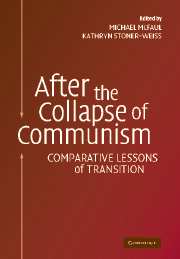Book contents
- Frontmatter
- Contents
- Contributors
- Introduction: The Evolving Social Science of Postcommunism
- 1 The Triumph of Nation-States: Lessons from the Collapse of the Soviet Union, Yugoslavia, and Czechoslovakia
- 2 The Fourth Wave of Democracy and Dictatorship: Noncooperative Transitions in the Postcommunist World
- 3 Circumstances versus Policy Choices: Why Has the Economic Performance of the Soviet Successor States Been So Poor?
- 4 Whither the Central State? The Regional Sources of Russia's Stalled Reforms
- 5 Parties, Citizens, and the Prospects for Democratic Consolidation in Russia
- 6 Comparative Democratization: Lessons from Russia and the Postcommunist World
- 7 Russians as Joiners: Realist and Liberal Conceptions of Postcommunist Europe
- Index
5 - Parties, Citizens, and the Prospects for Democratic Consolidation in Russia
Published online by Cambridge University Press: 07 September 2011
- Frontmatter
- Contents
- Contributors
- Introduction: The Evolving Social Science of Postcommunism
- 1 The Triumph of Nation-States: Lessons from the Collapse of the Soviet Union, Yugoslavia, and Czechoslovakia
- 2 The Fourth Wave of Democracy and Dictatorship: Noncooperative Transitions in the Postcommunist World
- 3 Circumstances versus Policy Choices: Why Has the Economic Performance of the Soviet Successor States Been So Poor?
- 4 Whither the Central State? The Regional Sources of Russia's Stalled Reforms
- 5 Parties, Citizens, and the Prospects for Democratic Consolidation in Russia
- 6 Comparative Democratization: Lessons from Russia and the Postcommunist World
- 7 Russians as Joiners: Realist and Liberal Conceptions of Postcommunist Europe
- Index
Summary
Scarcely anywhere has the semi-democratized political system of the new Russia appeared to stand in stiffer contrast to its predecessor, the prototypical communist dictatorship, than in the area of partisan activity. The Soviet regime banned overt opposition and insisted that all legitimate social interests find expression through one hierarchical pseudo-party. Having long since reduced elections, the hub of a traditional party's operations, to single-candidate charades, “the” party – the Communist Party of the Soviet Union (CPSU) – functioned essentially as ideological policeman, personnel department, and master coordinator and fixer for a disjointed state bureaucracy. Perestroika unleashed a quantum change in the late 1980s. Mikhail Gorbachev's sudden inauguration of electoral competition telescoped the universalization of the franchise, the work of generations in the West, into a few frenzied months. The same emancipating impulse led him to cripple the CPSU administrative apparatus and to ease curbs on public association, assembly, and communication. Politicized groups of all manner and description rapidly formed and took the stage. Elimination of the CPSU's legal monopoly in 1990 enabled almost any faction with an articulate spokesman and a photocopying machine to pose as a political party or movement. Two years after the Russian Federation emerged from the wreckage of the USSR in 1991, the Yeltsin constitution of 1993 enshrined the rights to organize parties and to vote freely for them. Aided by low barriers to entry, proportional-representation (PR) voting rules, and budget-subsidized campaigns, parties and party-like entities proliferated in Russia.
- Type
- Chapter
- Information
- After the Collapse of CommunismComparative Lessons of Transition, pp. 173 - 206Publisher: Cambridge University PressPrint publication year: 2004
- 3
- Cited by



